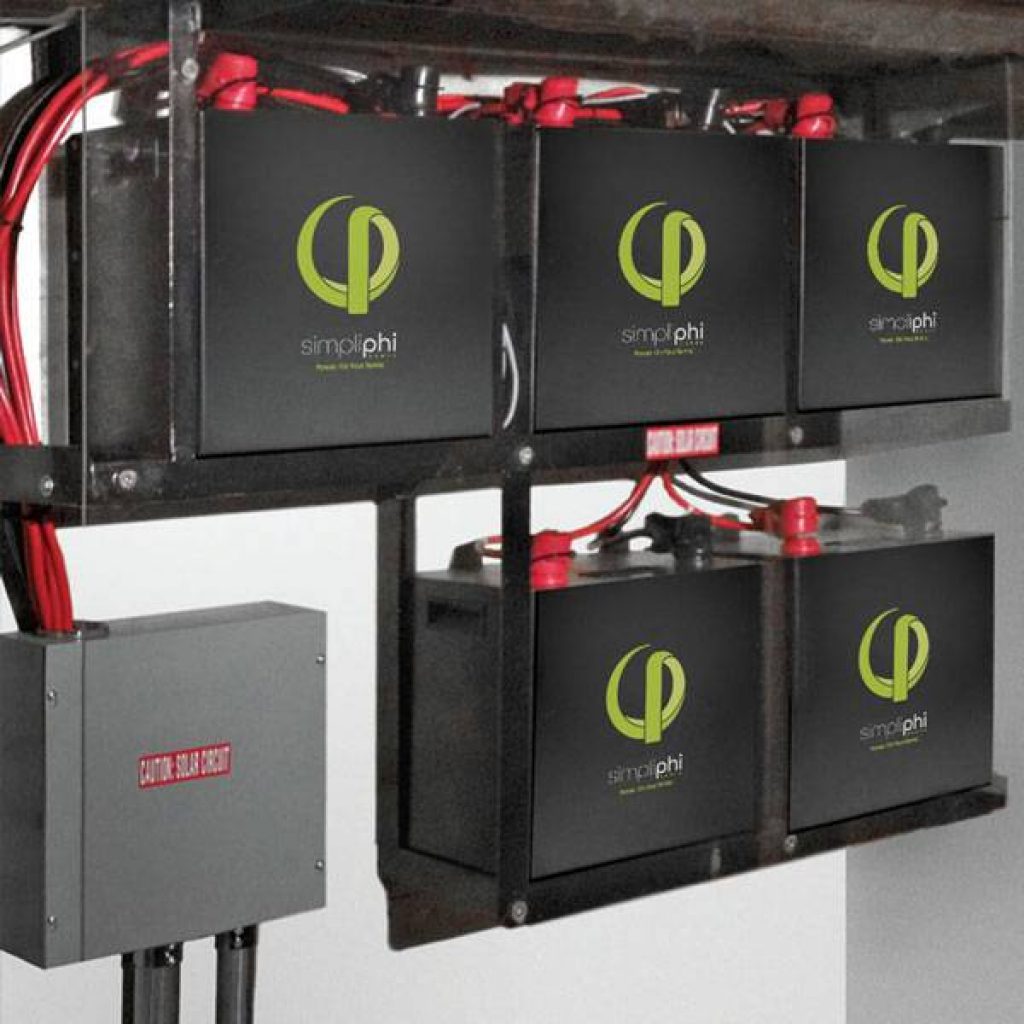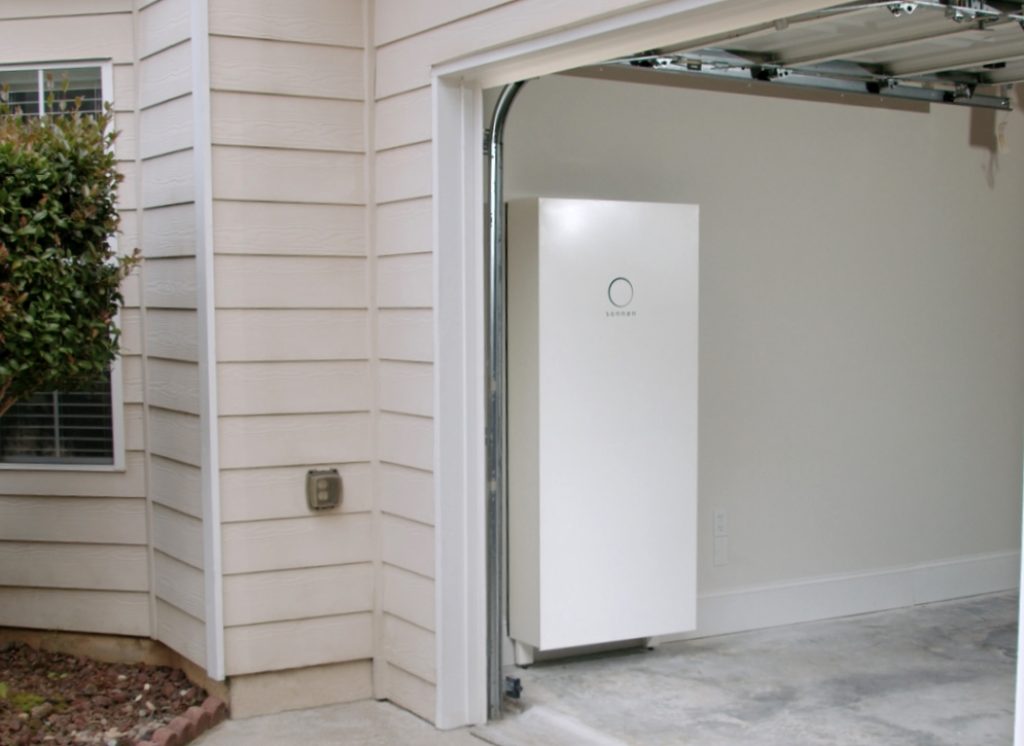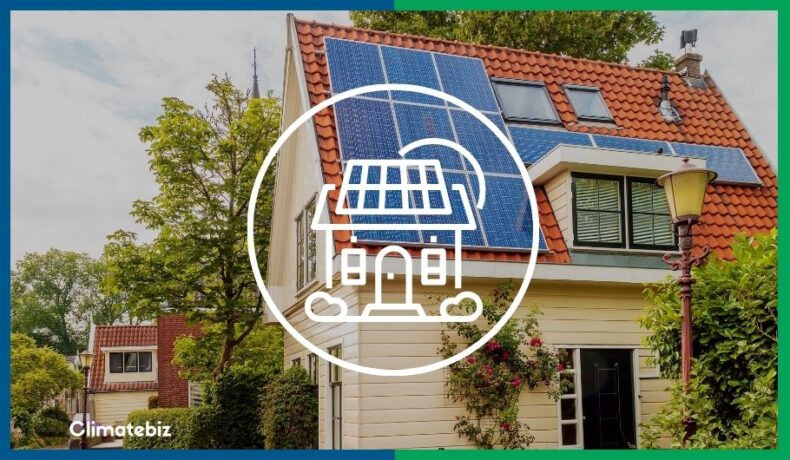Are you thinking of going solar? If so, you’re probably aware that choosing the correct solar battery for your home is a vital part of the process.
In fact, why wouldn’t you be thinking about going solar? Solar is a clean, renewable, free, and environmentally friendly energy source. Not to mention, it can save you money on electric bills in the long run.
As you probably know by now, a solar power system consists of solar panels installed on the roof of your house, which generate electricity.
To store the energy your solar panels generate during daylight hours, you’ll need solar batteries for home use.
Solar batteries increase the efficiency of your solar power system and, as a result, increase your energy autonomy since you can use solar energy even when the sun is no longer shining.
But with so many solar battery options on the market, how do you know which one is right for you?
In this article, we’ll provide a detailed discussion about solar batteries so you can make an informed decision when choosing a solar battery for your home.
We’ll explain the different types of solar batteries, how much they cost, what size battery you should get, what brands are best, and much more.
Table of Contents
Does My Home Need A Solar Battery?
There are a few factors to consider when deciding whether or not to buy a solar battery for your home. Here we present the main ones:
Size Of Your Solar Array
The first factor is whether or not you have enough solar panels to produce enough power to justify the cost of a solar battery.
If you only have a few solar panels, selling any excess power back to the grid may be more cost-effective.
However, suppose you have a more extensive solar panel array. In that case, a solar battery can help you save money by storing excess power for use during periods of high electricity prices or power outages.
Peak Sun Hours
Solar panels require a good amount of solar irradiance to thoroughly and efficiently charge a solar battery system.
If you live in an area with many peak sun hours, consider installing an energy storage system.
However, if you live in a cloudy or rainy area most of the time, getting a solar battery might not be cost-effective.
Time Of Use Rates
Like most products, electricity is subject to the law of supply and demand. During the day, when there’s sunlight and people are out and about, electricity demand is low. Therefore, companies charge less for electricity.
At night, when everyone returns home, there’s a peak in the energy demand. As such, the price of electricity is higher.
Combining solar panels with a solar battery can help you avoid these “peak hour” prices. You’ll be able to store solar energy during the day (while using grid power when it’s cheaper) and use it at night when your utility charges more for electricity.
Power Outages
If you live in an area with frequent power outages or are concerned about being able to maintain power during an emergency, then a solar battery system would be a good option for you.
However, if you have reliable grid power and do not plan to use your solar panels during a power outage, a solar battery may not be worth the investment.
Incentives And Rebates
You might be eligible for solar battery incentives depending on where you live.
These incentives and rebates can help you reduce the cost of your solar power system.
In such cases, adding a solar battery to your solar power system is worthwhile.
What Solar Battery Types Are Best For Homes?
There are different solar batteries for home use, but they all have something in common — the ability to deep cycle.
Deep cycle batteries are designed to run reliably and provide sustained power over an extended period.
In terms of storage system setup, you can go one of two ways: DC-coupled or AC-coupled.
Building Your Solar Battery Setup (DC-Coupled Batteries)

Source: sunwize.com
Probably the most affordable and most popular (although a bit “old-fashioned”) way is to buy all the components separately (standard solar batteries, inverter, charge controller, wires, etc.) and build your own customized solar panels + storage system.
This battery system delivers DC power, so you need to add one or more inverters to convert direct current (DC) into alternating current (AC).
However, building a solar storage system “from scratch” can be tricky since it requires a good understanding of basic electrical systems.
But don’t worry; if you’re looking for a more “plug-and-play” energy storage solution, you’ll be glad to know that manufacturers have developed integrated home solar battery systems.
Main Types Of Standard (DC) Solar Batteries For Home Use:
Each type has its advantages and disadvantages. Once you’ve figured out which features are essential to you, you’ll be able to decide on a solar battery.
Integrated Home Solar Battery Systems (AC-Coupled Batteries)

Source: solaflect.com
Although this type of home solar battery is more expensive, it’s far less complicated to install, especially if you already have a solar panel array installed in your home and only want to add a storage system.
This type of battery comes with its own inverter built into the box. A popular example is the Tesla Powerwall, but there are also great alternatives to the powerwall currently on the market.
With this type of solar battery for home, you don’t have to put a lot of thought into your storage system, you can connect your home battery to your house’s main panel, and the battery will deliver AC power. For this reason, this type of battery is often referred to as AC- coupled solar batteries.
AC-Coupled Home Battery Options
- Tesla Powerwall
- Panasonic EverVolt AC
- SONNEN Core
- Alpha ESS – Smile 5
- LGE ESS Home
- Enphase Encharge 10
Your Ideal Battery Will Depend On
- Your budget
- The size of the storage system you require
- Whether you already have a solar array or are looking to install one
What Size Solar Battery Does A Home Need?
Sizing your battery bank is crucial in choosing the correct solar battery for your needs.
The average energy consumption per household is around 29kWh per day (in the U.S.). However, this number can significantly vary depending on the size of your house and the number of appliances you have.
In addition, solar batteries are designed to be used as a backup system to deliver power for a limited amount of time (in case of a power outage/emergency, etc.), so you don’t need as much energy as you would spend in normal circumstances.
Therefore, an effective way to accurately size your solar battery (and save money) is to estimate your energy demand.
In order words, you need to determine the amount of energy (in Wh) that your home appliances require to function correctly.
Voltage
Another factor you should consider is the storage system’s voltage. The energy capacity of your solar battery is equal to the product of battery capacity and voltage:
Energy Capacity (Wh) = battery capacity (Ah) x voltage (V)
In other words, the energy capacity of your solar battery expresses how much current can be delivered at a particular voltage for a certain period.
Example
Consider a 10kWh 240V solar battery. Theoretically, this solar battery can deliver 41,6A for 1h at 240V. In reality, that’s a lot of energy, much more than any appliance requires and more than home electric systems can safely deliver.
However, this gives an idea of how long a battery lasts. For instance, this battery can deliver 4,16A at 240V (998W) for 10 hours or 2,08A at 240V (499W) for 20 hours, and so on.
Estimating Your Energy Demand
Step 1.
Check your appliances’ power ratings — most appliances show how many watts they consume. If not, check the voltage and current required by the appliance and multiply these two to find the power (Power = voltage x current).
Step 2.
Estimate the amount of time you wish to run each appliance.
Step 3.
Multiply the power rating of a particular appliance by its daily running time to find the energy required by this appliance per day.
For example, a fridge (about 170W) should be powered 24h a day; therefore, it will consume 170W x 24h = 4.080 Wh = 4,08 kWh daily.
Step 4.
The sum of the energy required (daily) by each appliance is your daily energy demand.
Step 5.
Determine how many days (or just hours) you would like your solar battery to power your home appliances. For instance, if you wish to have 2 days of energy autonomy, multiply your daily energy demand by 2. This will give you the total energy your home solar battery should be able to deliver to meet your needs (that is, the battery’s energy capacity in Wh).
Step 6.
Buy a battery with an energy capacity a bit higher than you need. This way, you’ll have a bit of wiggle room in an unexpected situation.
Once you’ve estimated your energy demand, you’ll be able to size your solar battery system accurately.
In general, a good energy capacity for a solar battery for home use (or a solar battery system with many individual batteries) is between 8kWh and 12kWh.
How Much Do Solar Batteries For Homes Cost?
Solar batteries for homes can cost anywhere from a few hundred to a few thousand dollars.
The price will depend on the size (considering voltage and capacity) and the type of solar battery you choose. For example, a small solar battery that only powers a few lights will cost less than a large solar battery that powers your entire home.
In general, solar batteries are a relatively affordable way to reduce your energy costs. Additionally, solar batteries can last for many years with proper maintenance, making them an excellent long-term investment.
Factors That Impact The Price Of Solar Batteries For Home
Prices vary according to battery chemistry, battery capacity, and manufacturer.
Logically, the more capacity a particular battery provides, the more expensive it’ll be.
In addition, the price range varies for each type of battery. For example, LiFePO4 batteries offer more advantages (higher energy density, longer cycle life, and higher depth of discharge) than lead-acid batteries, so they’re more expensive.
As previously discussed, there are three main types of solar batteries: LiFePO4, AGM, and Gel. We prepared a price list for each type.
LiFePO4 Battery: Average Cost
| Battery Capacity (Ah) | Voltage (V) | Average Price (USD) |
|---|---|---|
| 50 Ah | 12V | $470 |
| 100 Ah | 12V | $940 |
| 200 Ah | 12V | $1450 |
| 300Ah | 12V | $2480 |
AGM Battery: Average Cost
| Battery Capacity (Ah) | Voltage (V) | Average Price (USD) |
|---|---|---|
| 50 Ah | 12V | $230 |
| 100 Ah | 12V | $370 |
| 200 Ah | 12V | $760 |
Gel Battery: Average Cost
| Battery Capacity (Ah) | Voltage (V) | Average Price (USD) |
|---|---|---|
| 50 Ah | 12V | $250 |
| 100 Ah | 12V | $450 |
| 200 Ah | 12V | $1180 |
For a more detailed discussion of the cost of solar batteries, we suggest taking a look at our Solar Battery Cost article. There, you can find a list of prices for different battery types, capacities, and manufacturers.
AC-coupled Average Prices
| Model | Energy Capacity | Price (USD) |
|---|---|---|
| Tesla Powerwall | 13.5 kWh | $10,500 |
| Panasonic EverVolt | 11.4 kWh | $15,000 |
| Alpha ESS – Smile 5 | 13.5 kWh | $7,700 |
| Fortress Power eVault | 18.5 kWh | $15,299 |
| LGE ESS Home | 9.8 kWh | $12,000 |
| Sonnen Core | 10 kWh | $12,500 |
How Long Will A 5 kWh Solar Battery For Your Home Last?
The running time of a solar battery depends on how much power (current x voltage) you draw from it.
5 kWh (or 5000 Wh) can last a long time or very little. Let’s see why:
Suppose you install a 5 kWh solar battery in your home. During a power outage, this battery system kicks in and starts to power all your home appliances.
You turn off every non-essential appliance and keep only the essentials running (refrigerator, ventilation, heating system, lights, phone chargers, etc.). In this case, you’ll consume less power, and your 5kWh will last longer.
Example
Let’s say you only keep the following appliances running during a power outage:
- Refrigerator/freezer (170W)
- A few lights (50W)
- Phone charger (10W)
- TV (80W)
- Wifi Router (15W)
In this case, you’ll be drawing a total wattage of 325W.
Therefore, your 5 kWh battery should last 15 hours. Here’s how we`ve reached this number:
Energy Capacity (Wh) = wattage (W) x running time (h) ∴
Running time (h) = energy capacity (Wh) / wattage (W)
Running time (h) = 5000 Wh / 325 W = 15,38 hours
Conversely, if you draw a total of 900W, for example, then your 5 kWh battery will only last 5 and a half hours:
Running time (h) = 5000 Wh / 900 W = 5,55 hours
Running Time Chart For 5 kWh Solar Battery
To make things easier for you, we have prepared a short running time chart to give you an idea of how long can a 5kWh solar battery last when powering certain home appliances:
| Appliance/Device | Power Rating (W) | Running Time With a 5kWh Solar Battery |
|---|---|---|
| Refrigerator | 170 W | 29,4 h |
| Medium Size TV | 80 W | 62,5 h |
| 3 LED lights | 3 x 9 W (each) = 27 W | 185 h |
| Power Tools | 1000 W | 5 h |
| Coffee Maker | 1300 W | 3,8 h |
| Microwave | 1400 W | 3,5 h |
| Ceiling Fan | 70 W | 71 h |
| Wifi Router | 15W | 333 h |
| Phone Charger | 10 W | 500 h (~200 charges) |
| Laptop Charger | 60 W | 83,3 h |
| Electric Heater | 1500 W | 3,3 h |
| Medium A/C | 1200 W | 4,2 h |
How Long Will A 10 kWh Solar Battery For Your Home Last?
Again, it depends on how much power you’re drawing from your solar battery.
You can refer to the example shown in the previous section to understand how to calculate how long your solar battery will last depending on the amount of power you draw from it.
Running Time Chart For 10 kWh Solar Battery
Here’s a running time chart for a 10 kWh solar battery:
| Appliance/Device | Power Rating (W) | Running Time With a 5kWh Solar Battery |
|---|---|---|
| Refrigerator | 170 W | 58,8 h |
| Medium Size TV | 80 W | 125 h |
| 3 LED lights | 3 x 9 W (each) = 27 W | 379 h |
| Power Tools | 1000 W | 10 h |
| Coffee Maker | 1300 W | 7,6 h |
| Microwave | 1400 W | 7 h |
| Ceiling Fan | 70 W | 142 h |
| Wifi Router | 15W | 666 h |
| Phone Charger | 10 W | 1000 h (~400 charges) |
| Laptop Charger | 60 W | 166,6 h |
| Electric Heater | 1500 W | 6,6 h |
| Medium A/C | 1200 W | 8,4 h |
Best Solar Battery Brands For Your Home
DC-Coupled Solar Batteries
A few standard solar battery brands stand out from the rest in terms of quality, performance, and cycle life. Below we list a few of these brands:
- Battle Born
- Renogy
- Relion
- SimpliPhi
- Canbat
- Trojan
AC-Coupled Solar Batteries
Now, if you’re looking for a modern “all-in-one” solar battery for your home, here are the top brands:
- Tesla
- Panasonic
- LG Chem
- Sonnen
- Generac
- Emphase
- Vottery
- BigBattery
Final Thoughts
A solar battery can be an excellent investment for your home. Not only will it help you save money on your electricity bill, but it can also provide backup power in the event of a power outage.
There are several factors to consider when choosing a solar battery — price, storage capacity, and warranty period.
By taking the time to research your options and find the best solar battery for your needs, you can rest assured that you’re making the right decision for your home and wallet.
We hope this article has answered all your questions about solar batteries for home use. If not, feel free to leave us a question in the comment section below!

